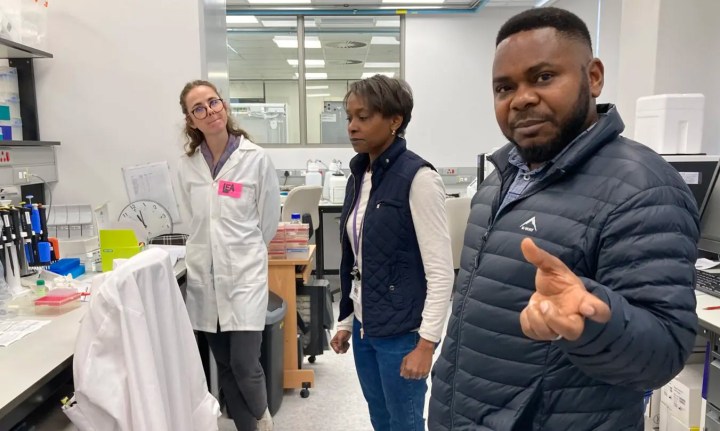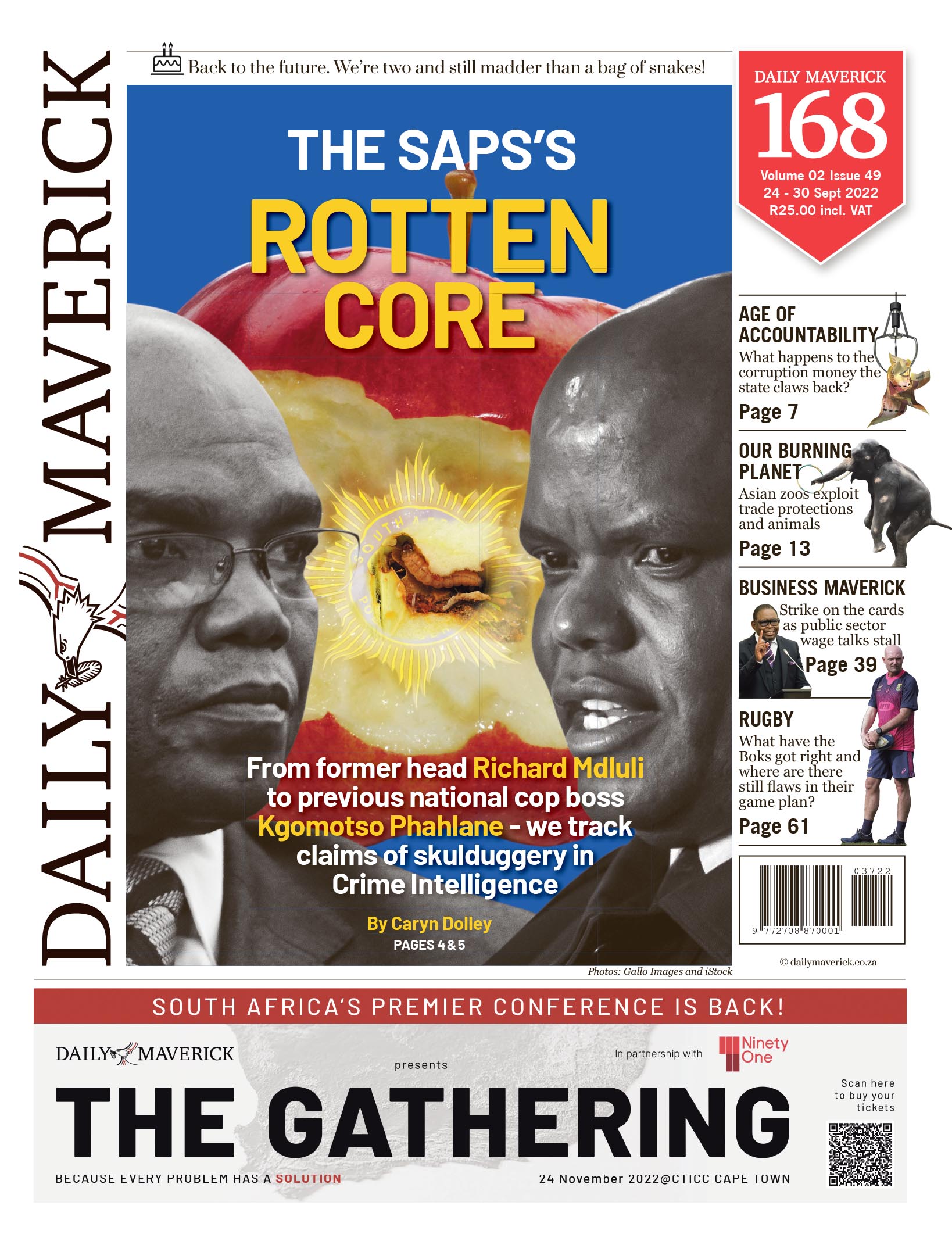ROYAL SOCIETY AFRICA PRIZE
A TB scientist’s remarkable journey from a Cameroon village to a Stellenbosch University research lab

A top Stellenbosch scholar worked part-time as a street vendor while studying towards his honours degree – now his groundbreaking research on diagnostic tests has won the Royal Society Africa Prize.
In 2004, Novel Chegou left his home country, Cameroon, in search of a better life in South Africa. With high hopes and not much money, he sold African crafts – beads, masks and carved stones – next to the village green in Stellenbosch to save for his studies at the town’s university.
Today, Chegou (44) is a full professor in molecular biology and human genetics at Stellenbosch University’s Department of Biomedical Sciences. He heads a tuberculosis biomarker research laboratory and has contributed to several patents for TB diagnostic tests, which are already being used around the world.
Last month, the Royal Society – the independent scientific academy of the UK with illustrious fellows such as Albert Einstein – announced Chegou as this year’s winner of the Royal Society Africa Prize, an annual award recognising innovation by a research scientist in Africa.
Deadly childhood TB
Lately, one of Chegou’s main interests is TB meningitis (TBM), or TB of the brain, in children. Better TBM tests are urgently needed since children are frequently diagnosed too late to stop irreparable brain damage or death. It is for his work in this area that Chegou has been honoured.
“TB meningitis, it’s a very terrible disease,” he says. “I started working on TBM a few years ago, learning about the challenges in diagnosing the disease. Children are coming to day hospitals up to six times before they get diagnosed with TBM. But by then often the brain is gone.
Yesterday we were very happy to announce the winners of this year’s Royal Society medals and awards. 28 individuals and teams were honoured for their incredible contributions to science and research. Meet the winners and find out more about their work: https://t.co/nZXKrUfMlP pic.twitter.com/VlGfBhx9yQ
— The Royal Society (@royalsociety) August 25, 2022
“It’s one of the most difficult types of TB to diagnose. You really need advanced tools and expensive equipment. Most of the time children will never be normal again by the time it is diagnosed. There are so many neurological consequences – even if they are treated successfully. The problem is the poor accuracy of current diagnostic tools.”
Of children diagnosed with TBM, he adds, an estimated 20% will die.
Read more in Daily Maverick: “Government outlines nation’s TB recovery plan as testing volumes show improvement”
“It’s really bad,” says Chegou, himself a father of three. His wife holds a master’s degree in agricultural economics from Stellenbosch University.
The family lives in Bellville, but the scholar is often on the road. After our interview, Chegou was due to catch a flight to Durban for South Africa’s seventh annual TB Conference, where he delivered a talk. Two weeks before our interview, he was presenting his work at a TBM conference at Oxford University.
‘Opportunities every step of the way’
Inside Chegou’s sun-washed office overlooking the Tygerberg campus, we are looking at his computer monitor, where he has called up his research papers on Google Scholar. He points to his third-most-cited paper, “Host markers in QuantiFERON supernatants differentiate active TB from latent TB infection: preliminary report”, which was published in the journal BMC Pulmonary Medicine in 2009.
“This one is special, I’m really proud of it,” he says. “It was a part of my PhD research. Actually, it was the reason for my MSc project to be upgraded to a PhD, and led to my first patent.”
“There is an urgent need for new #diagnostic tests for tuberculosis. Particularly field-friendly point-of-care tests for all types of #TB, that work in both adults and children,” Dr Novel Chegou said at the recent Annual Academic Day. #TBtests #research https://t.co/6k3nqtrHna pic.twitter.com/mYMvKTUbSd
— SU, Faculty of Medicine and Health Sciences (@SUhealthsci) September 28, 2018
Outside, a train rumbles past. Chegou gestures at the window, saying this was the same train he used to take between Stellenbosch and Tygerberg back in 2005 when he was still a part-time street vendor.
Reflecting on his past, Chegou throws back his head, emitting high-pitched peals of laughter.
His demeanour is that of wide-eyed wonder at the fortuities sprinkled across his journey.
Read more in Daily Maverick: “Experts weigh in on the potential of ultrasound for diagnosing TB in kids”
“So yes,” he says, “in life, it’s about taking a chance. If an opportunity comes, make the most of it. Look at me, look where I come from. It seems like what happened to me is this – God put people to help me everywhere, opportunities every step of the way.”
‘I will work and you will go to school’
One of four siblings born to poor parents in Ajei village, in the Anglophone northwest of Cameroon, Chegou was orphaned when he was 14 years old.
“Unfortunately, my mother died when I was about seven years old. Then my dad died when I was 14. I had just started secondary school, so it was terrible. I was like, okay, is this it? I won’t be able to go to school. But then my brother was like, I will work and you will go to school.”

Professor Novel Chegou heads the Diagnostics Research Laboratory which forms part of Stellenbosch University’s Immunology Research Group. (Photo: Supplied)
Chegou’s brothers did not finish school. His younger sister later studied from home and became a nurse.
“I used to walk to school, a very long distance,” he says. “In Cameroon, we don’t even know the distances or measure it. I would start walking in the morning at 6am through the forest, you know, along little paths, walking the whole day, arriving in the village where the school is maybe at around 7pm. I’d carry all my food from home – oil, you know, those things. I had no money. Luckily in Cameroon food is very cheap. If it wasn’t for that, there’s no way I would have survived.”
In the village where he went to school, Chegou stayed over with a cousin. Growing up, he knew he wanted to become a doctor, but there were hurdles.
“By the time I finished high school, we only had one medical school in Cameroon, which was taking a maximum of 75 students a year, for the whole country. So to get in was very difficult. I don’t think it was always on merit either,” he says, laughing.
Visit Daily Maverick’s home page for more news, analysis and investigations
This medical school – at the University of Yaoundé – was in the French part of the country, which was in regular conflict with Chegou’s Anglophone region. But, as luck would have it, a year later a second medical school opened at the University of Buea, in the Anglophone northwest. An uncle gave him money to register for the entrance examination, and he passed.
Read more in Daily Maverick: “Mobile X-ray TB screening pilots show early signs of promise in South Africa”
“Then, suddenly, they changed the minister of higher education,” says Chegou. “And the new guy came out of nowhere and started giving scholarships to the top students in each programme. This covered my second, third and fourth years at university – the school fees. It was like 53,000 francs, which was about R1,000 then. And then after I graduated, I think that guy, they removed him. They stopped that scholarship thing. So I’m like, it looks like that scholarship was created especially for me!”
While at university, Chegou and fellow students would share money, food and textbooks. For some time as a student, he lived with a relative free of charge.
‘Next to the Checkers in Stellenbosch’
After graduating from the University of Buea as a medical laboratory scientist, Chegou moved to South Africa.
“I was struggling to find a university to study further,” he says. “I was applying around the world. [During] that time my brother, my older brother, found himself in South Africa. He was staying in Stellenbosch and he said to me, there’s a nice university here, come! Okay. So I came here in 2004 and I started applying to Stellenbosch University and to UCT [the University of Cape Town]. My brother was here on business, he was a street vendor. And at the beginning, I worked with him too.
Amazing! Prof @Novelchegou in our faculty’s Department of Biomedical Sciences @StellenboschUni is this year’s winner of The @royalsociety Africa Prize.
READ MORE here <https://t.co/stVGov4rrj> and click on the video below to get to know Prof Chegou.https://t.co/qfRILHzPAY
— SU, Faculty of Medicine and Health Sciences (@SUhealthsci) August 24, 2022
“Next to the Checkers in Stellenbosch, next to the church, we used to sell African art – from masks to carved stones to beads.
“In 2005, when I started my honours, I used to go to that market in the morning to unpack our display goods, then I took the train to Tygerberg for school. At the time I had people helping us sell the crafts during the day. After university, I’d take a train back to Stellenbosch, to pack up our stand and to collect the money.”
Defying the odds, he not only completed his degree that year, but the South African Society for Biochemistry and Molecular Biology also named him best honours student in South Africa.
Training the next generation
At Tygerberg today, Chegou supervises nine postgraduate students in his laboratory. During a tour of the premises, Chegou introduces technical officer Candice Snyders and honours student Leandré van Rooyen. Talking to his colleagues, Chegou emits more of his trademark peals of laughter. One cannot help but join in.
All going well, Chegou will probably travel to Britain in November to accept his Royal Society award. DM168
Biénne Huisman is a freelance journalist and writer.
This article was published by Spotlight – health journalism in the public interest.
This story appeared in our weekly Daily Maverick 168 newspaper, which is available countrywide for R25.





















 Become an Insider
Become an Insider
Comments - Please login in order to comment.